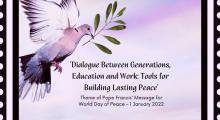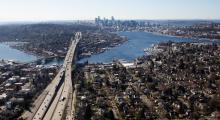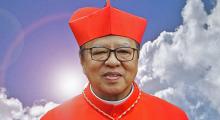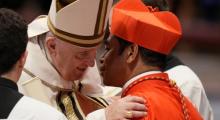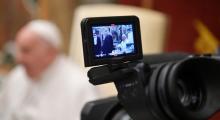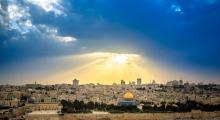Issued by the Catholic Center for Studies and Media - Jordan. Editor-in-chief Fr. Rif'at Bader - موقع أبونا abouna.org

According to local reports, after two weeks of virtual house arrest in the curia house, Bishop Rolando Alvarez of Matagalpa, Nicaragua, was taken away by police in a convoy of at least eight patrol cars at approximately 3 a.m.
100%Noticias, a Nicaraguan news outlet, reports that eyewitnesses saw the bishop, together with eight of those who had been forced to remain at the curia, being taken out of the city.
Boletin Ecologico, another local news outlet, has videos of the church bells ringing to warn the people of Matagalpa that the police were taking the bishop, in the early morning hours of Friday, August 19.
Among those who have confirmed that the police “kidnapped” the bishop is Father Edwin Roman, who was forced into exile last year. He has been living in Miami, along with Bishop Silvio Baez, auxiliary of Managua, who was asked to leave the country by Pope Francis.
Several sources have told Crux in recent days that the government of Ortega wants to silence Alvarez “at any cost” and that the bishop was offered to either leave the country or face prison. The prelate, who was exiled in the 1980s by the Sandinista revolution that first brought Ortega to power, has steadily refused to leave Nicaragua.
If the regime of President Daniel Ortega and his wife, Vice President Rosario Murillo, stay true to form, the bishop and those with him will be taken to the infamous El Chipote prison in Managua, where over 190 political prisoners are being held.
Alvarez, together with five priests and six laity, had been trapped in the curia since August 3. The following day, the police released a statement saying the bishop was being investigated. Three lay people had been allowed to leave the curia before the police raid.
The police statement accused the bishop of “organizing violent groups, inciting them to carry out acts of hatred against the people,” with the intention of “destabilizing the State.”
“Formally they have said that our house is our prison,” the bishop said at the time, interpreting the police statement.
Since his house arrest, Alvarez continued to say Mass – broadcast online – with messages focused on forgiveness and a God who “sees it all, and in the Eucharist that conquers darkness and inequality, that in each Mass makes the hells tremble.”
He also said that he and those detained with him were placing their trust in God, “joyful because he is with us, because our strength and internal hope comes from him, our serene joy, our firm hope and conviction that God does not disappoint, that God always has the last word in history and in our history.”
The Vatican has yet to comment on what is happening in Nicaragua, with no high-ranking official even referring to Alvarez’s house arrest.
On Wednesday, August 17, 26 former heads of state of Latin America and Spain expressed their concern over the “religious persecution unleashed by the dictatorship” and asked Pope Francis to come out in defense of the Nicaraguan people and religious freedom.
The Ortega-Murillo regime has long seen the Catholic hierarchy as their enemy, with Baez, Alvarez and Cardinal Leopoldo Brenes of Managua often being criticized by the regime.
Several bishops’ conferences have also expressed their support for the church in Nicaragua, including CELAM, the regional bishops’ commission for Latin America and the Caribbean.
Cardinal Oscar Rodriguez Maradiaga of Honduras this week said that “this quiet war that they are carrying out to persecute Jesus in his Church in the sister nation of Nicaragua, is not the fire that Jesus came to bring.”
In El Salvador, Cardinal Gregorio Rosa Chavez, said that the persecution of Catholics in Nicaragua is the “most horrific case of martyrdom” in the region.
Nicaragua's Diocese of Siuna has also reported the arbitrary arrest of one of its priests amid growing tensions between the Church and the government of President Daniel Ortega.
According to a statement released on August 15, Fr. Oscar Danilo Benavidez Tinoco, pastor of Holy Spirit Parish, was apprehended by the police in the local municipality of Mulukuku, in Northern Nicaragua, after officiating evening Mass.
The diocese learnt later that he was subsequently transferred to a detention and alleged torture centre in the capital Managua, known as “El Chipote”.
The reason of his arrest is unknown and the Nicaraguan Center for Human Rights (Cenidh) affirmed that he is arbitrarily detained. In its statement the Diocese of Siuna invited the Catholic faithful to join in prayer for Fr. Benavidez.
The diocese said his "only mission is and has been to announce the Good News of Jesus Christ, who is the Word, Life and Salvation for all."
Fr. Benavidez is the third priest arrested so far this year in Nicaragua, and the ninth cleric in police custody.
These include Bishop Rolando Álvarez of Matagalpa and five other priests who have been under house arrest since August 4 on grounds of using media and social networks to carry out acts of violence and to destabilise the country.
In a video that went viral, Bishop Alvarez was seen on his knees begging for mercy while a group of armed police officers surrounded him. Siuna was the first diocese that offered its public support to Bishop Álvarez, whose arrest has been also unanimously condemned by bishops across Latin America.
Meanwhile, last week the Nicaraguan police issued another law enforcement measure banning a Marian procession scheduled in Managua for August 13 on the occasion of the Marian Congress held on August 7-15 and at the the conclusion of the national Our Lady of Fatima pilgrimage.
Relations between the Sandinista Government and the Church have plummetted since 2018, when Nicaraguan authorities clamped down on protests against a series of controversial reforms to the social security system.
Despite attempts to mediate in the crisis, bishops were ultimately banned from the dialogue and relations further worsened after the controversial 2021 elections which confirmed President Ortega for a fifth term amid allegations of fraud and the political persecution of rival presidential candidate.
Since the outbreak of the crisis, the Church has been the target of nearly 200 attacks and desecrations, as well as harassment and intimidations of clerics, with bishops being branded as terroriststs. In 2019, Managua Auxiliary Bishop Silvio José Báez was forced to leave the Diocese of Managua at Pope Francis’s request after receiving several death threats.
Early in July, the Government expelled the Missionaries of Charity (MC), after expelling in March the Apostolic Nuncio to Nicaragua, Polish Archbishop Waldemar Stanislaw Sommertag.
The Holy See has also expressed concerns over the latest developments in Central American nation.
Speaking on August 11 at a Special session of the Organization of American States (OAS) focused on the situation in Nicaragua, the Vatican Permanent Observer Msgr. Juan Antonio Cruz Serrano appealed to the parties “to find ways of understanding, based on respect and mutual trust, seeking above all the common good and peace.


